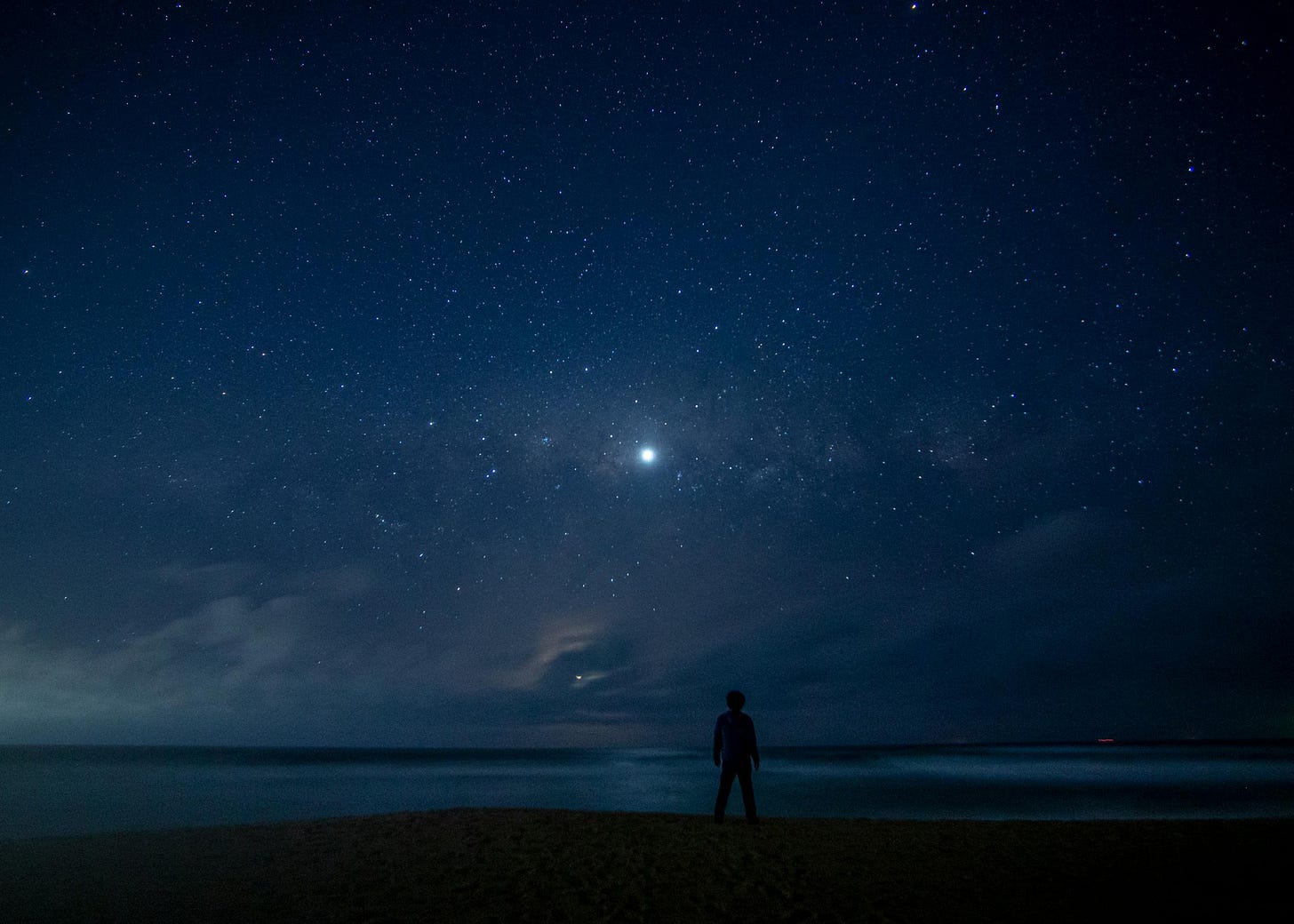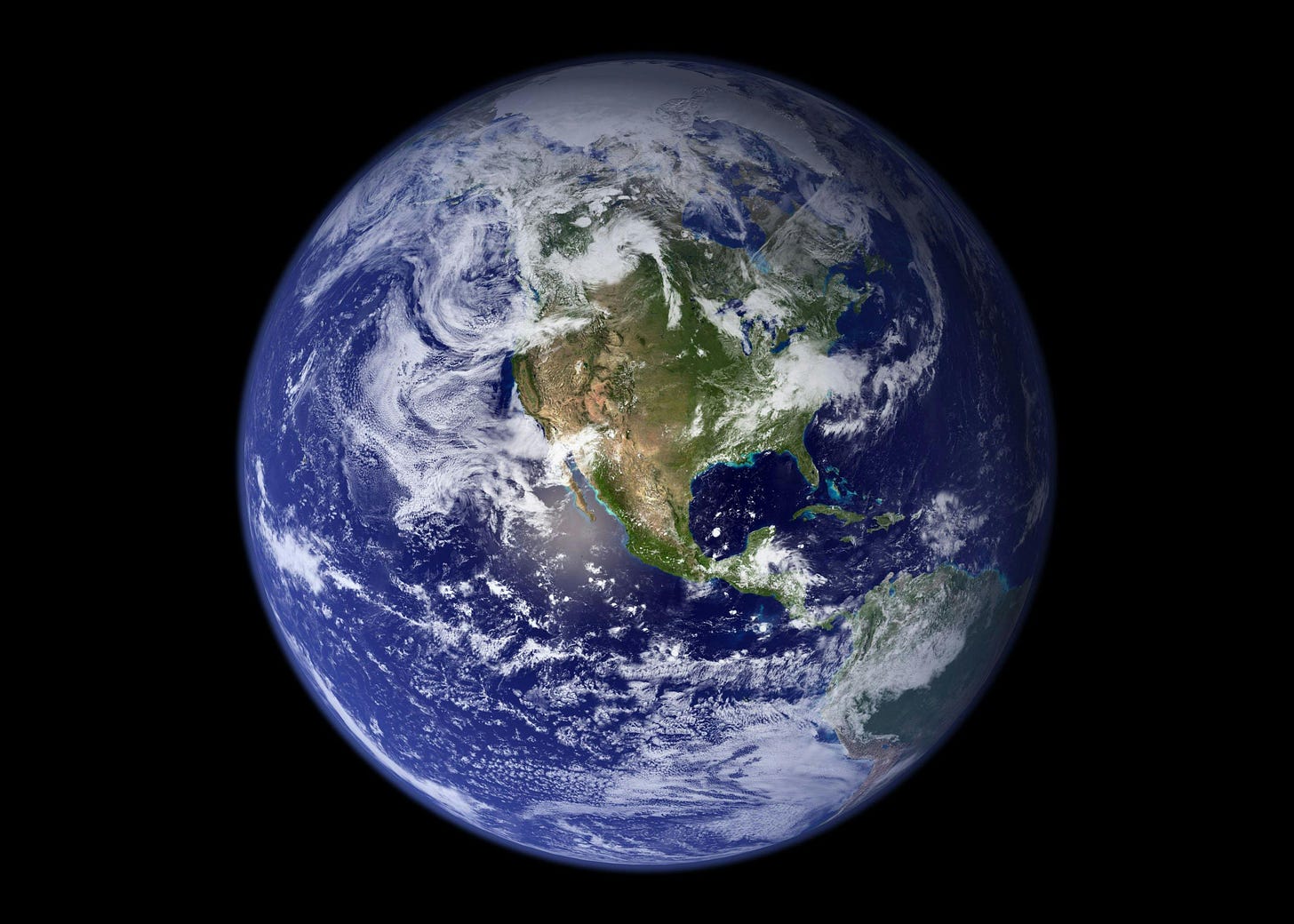Awe and the elasticity of time
Unravelling how wonder expands time and changes the way we think about the world
I once felt time stand still.
It was midnight, and I was on a tiny boat off the coast of a tiny island, which itself was off the coast of a slightly larger island, just west of Cambodia. I climbed over the edge of the tiny boat, melting into the dark water, wearing a rapidly deflating life jacket. Others aboard did the same, silently submerging their shaking limbs with wide eyes.
I kicked my legs. Telling myself to focus on the cool, velvety sea water and not my barely-there life jacket or the definitely-not-there coastline – it had taken a long trip away from the shore to get us here, after all. I wondered how tall a building would need to be to fit between the soles of my feet and the sea bed, hundreds of metres below. Then, a warning cry. The light at the front of the boat that had guided us from land was switched off. Suddenly, complete and utter darkness.
But only for a second, because the sky exploded into view. I threw my head back to see it was illuminated by stars. More stars than I thought possible. It felt electric to realise that I could see the hazy blue band of the Milky Way arch like a great arm overhead, even trace the faint smudge of Andromeda, our galactic neighbour, my eyes darting through the dark depths. It felt like I spent hours not mere moments analysing each patch of sky, hunting for more cosmic treasures.
That was the first instance of time slowing that night, stretching a little. But the water below was just as spectacular. It mirrored the night sky, with specks of glitter dancing, impossibly bright, leaving trails of luminosity. As I moved my hands in front of me, watching these mini galaxies swirl in eddies between my fingertips, it happened. Time simply, stopped.
The glittering star clusters were no longer orbiting my hands, but were suspended in the water in front of me. In the stillness, it seemed as if I could count every dot of light above and below me, feel the starlight caress my skin, taste the electrifying salt water on my tongue, no longer hear the splashing of other people around me, but instead could almost make out the deep exhale of every living thing.
In that great pause that could have easily lasted a lifetime, I wondered if I might slip into oblivion, let the star-speckled darkness enfold me. I felt fear, excitement, a surge of the most visceral aliveness. “I’m floating through space,” I thought, or whispered, or maybe even screamed at the top of my lungs.
What I was experiencing was phosphorescence – the glow of tiny organisms, invisible by day, that ignite in the darkness, shimmering brighter with every splash and ripple as they dance in the night sea.
The intense emotion I was feeling was awe – a complex, hard-to-pin-down state, often a blend of surprise, fear, and deep reverence. In psychology, awe has two key components. First, it involves a sense of perceived vastness, whether physical, conceptual, or existential. In simple terms, it’s the realisation that what we’re witnessing is overwhelmingly big. Second, awe sparks a need for “accommodation”—the drive to make sense of this vastness, requiring us to shift our thinking or beliefs to better integrate our new perspective.
You’ve likely felt awe before, perhaps in smaller doses. While watching a breathtaking sunset, as the oranges and yellows of the sky melt together and the sun transforms into a glowing red ball, retreating beneath the horizon. Or standing at the top of a mountain, where the landscape unfolds for hundreds of miles in every direction, and you breathe in the deepest, most satisfying breath you’ve ever taken, feeling briefly limitless.
Researchers are increasingly fascinated by awe because they believe its effects can be profoundly positive, with links to improved well-being and increased generosity. However, the science is still in its early stages. Awe is difficult to replicate, and its many components – fear, appreciation of beauty, and a sense of oneness—are hard to tease apart when we’re faced with the vastness of a sunset, a towering mountain range, or the infinite expanse of the universe.
My experience of intense awe, leading to the sensation that time had slowed or even stood still, feels magical but isn’t unique. Stories of time seeming to slow are more common than you might think. This suggests that time isn’t a universally concrete experience, but in certain circumstances – especially when intense emotions are involved – it can feel subjective.
Research has shown this time-warping effect occurs with some of the most intense emotions we experience, particularly fear and awe. Initially, some scientists believed these heightened emotions might sharpen our senses, making us superhuman for a split second. The idea was that in moments of acute fear or awe, we might perceive more details faster, almost like a survival mechanism. But the more widely accepted explanation now points to memory. When emotions are running high, we tend to remember more details, creating the illusion that time has slowed. In the case of fear, this makes evolutionary sense: remembering what caused fear helps us avoid danger in the future or know how to escape it.
But why awe? Some studies suggest that awe-inducing stimuli – often pictures of vast, beautiful landscapes used in research – can lead to a distortion of time perception, particularly something called 'temporal lengthening.' This means that time seems to expand, both in the moment and in our memory of it. Awe not only heightens our awareness but stretches our sense of time, leaving a lasting imprint on how we perceive and remember the experience.
Maybe the reason for this stretching of time when we experience awe is not just about remembering something that could prove useful, as is the case with fear, but about learning something deeper – about ourselves, the Earth, and the universe. I can’t talk about awe without mentioning the Overview Effect, a phenomenon that has fascinated me my entire life. I like to think of it as the ultimate form of awe – wonder distilled.
It’s best described as a cognitive shift that astronauts experience when they see Earth from space. Reading their accounts is profoundly moving. They describe feelings of immense beauty, admiration, respect, and love – not just for themselves, but for their communities, the planet, and, crucially, all of humanity. Like my admiration of the swirling space dust in the sea, there is some evidence that the Overview Effect can also distort time, slowing it down. It’s as if the universe is inviting us to fully take in the moment. Beyond that, many astronauts also report a lasting sense of expansion – a broader understanding of time and a heightened feeling of responsibility for how they spend it.
We don’t fully understand the mechanisms behind why awe seems to slow down time, or what it's trying to reveal to us. Perhaps it’s simply the intensity of the emotion – its gravity – that forces us to pay closer attention, laying down deeper memory foundations that serve us in the future, much like the way fear leaves a lasting and useful imprint.
But I believe awe might hold something more. Perhaps our experience of awe is slower so we can better recall our experiences and share them with others, as astronauts do when they return to Earth. I’m reminded of a quote from Mary Oliver’s Sometimes that I repeat like a mantra when I’m feeling a little lost: “Instructions for living a life: Pay attention. Be astonished. Tell about it.”
Or maybe awe is about personal transcendence – a cosmic lesson waiting to be learned. A wake-up call that demands to be answered. It's as though the universe cradles us in these moments, while gently and lovingly shaking us from whatever stupor we’ve fallen into. Feel this and be here, it whispers. Never forget this, it urges. Let this move you so deeply, so profoundly, that you are never the same again.





Loved this - more please. Really felt like I was there in the water at the start.
Wow Becca. This is what I needed to read today! I too am obsessed with the overview effect, though I’d never have the balls to go into space. Maybe staring up at is the closest I’ll get. Ps you may have already come across her work but Julia Baird, an Australian Author and broadcaster has written a book on awe called Phosphorescence which is a beautiful, life affirming read.